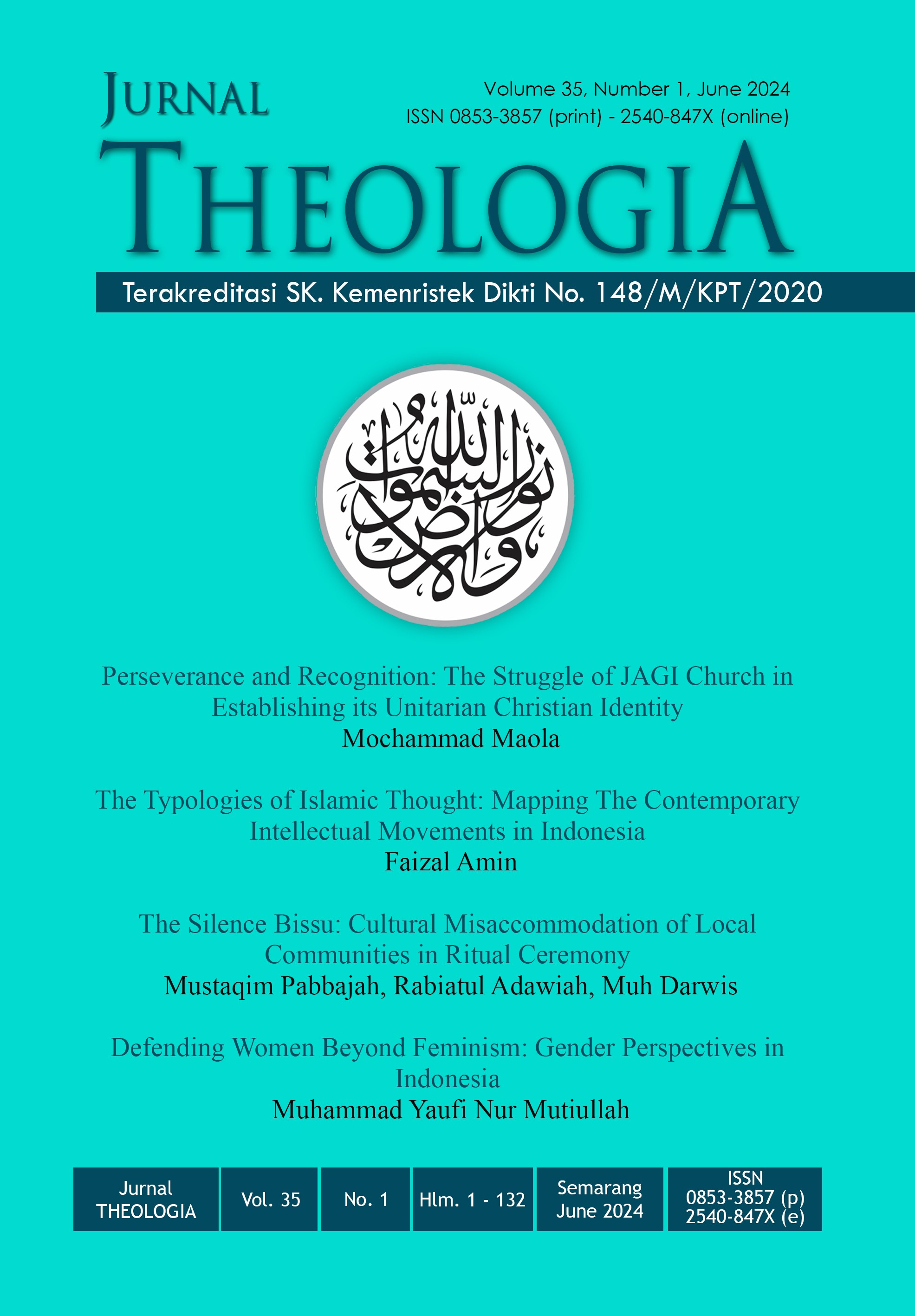Tariq Ramadan's Concept of Tolerance and the Muslim Identity Crisis: An Islamic Psychological Perspective
DOI:
https://doi.org/10.21580/teo.2025.36.2.28338Keywords:
Tolerance, Tariq Ramadan, Muslim Identity, Islamic Psychology, PluralismAbstract
This article examines the concept of tolerance in Tariq Ramadan's thought as a solution to the identity crisis faced by contemporary Muslims, making Ramadan's tolerance the primary unit of analysis. This research aims to examine how the construction of tolerance offered by Ramadan—which is rooted in Islamic spirituality, dialogue ethics, and psychological awareness—can serve as a framework for restoring the Muslim identity amidst the dynamics of globalization, plurality, and modern cultural pressures. Utilizing library research methods with a qualitative, descriptive, and analytical approach, as well as content analysis, this study examines primary works by Ramadan, along with relevant secondary literature on tolerance, Muslim identity, and Islamic psychology. The study's findings reveal that Ramadan rejects the model of passive tolerance based on power relations and proposes an alternative model of active tolerance, grounded in tawhid, the recognition of God's will in diversity, and the integration of qalb, reason, and social ethics. An analysis of Islamic psychology reveals that tolerance within the framework of Ramadan has a spiritual dimension that can help overcome the crises of meaning, alienation, and identity polarization. The contribution of this research lies in presenting a conceptual model of tolerance with Islamic psychological nuances that can serve as the basis for strengthening Muslim identity, as well as the development of educational, counseling, and intergroup dialogue practices in multicultural societies.
Downloads
References
al-Attas, S. M. N. (Director). (2024, December). Seyyid Muhammed Naquib el-Attas—1.Uluslararası Stratejik Müzakereler Forumu [Video recording]. Gaziantep İslam Bilim ve Teknoloji Üniversitesi. https://youtu.be/mJ5JOCmVUdQ?si=aeIhPBBByYIn7IHS
al-Qarḍāwī, Y. (n.d.). Ghayr al-Muslimīn fī al-Mujtama‘ al-Islāmī. Maktabah Wahbah.
Anwar, S., Fauzi, M., Yani, A., & Siswoyo. (2023). Toleransi Dalam Pandangan Imam Mazhab Dan Ulama Kontemporer Perspektif Hukum Islam. Hutanasyah: Jurnal Hukum Tata Negara, 1(1), 117–134. https://doi.org/10.37092
Arif Amrollah, M. W. (2022). Al-Iṣlāḥ al-Jadhrī ‘inda Ṭāriq Ramaḍān (Dirāsah Waṣfiyyah Taḥlīliyyah) [Thesis]. University of Darussalam Gontor.
Armayanto, H. (2024). Membangun Kerukunan dalam Bingkai Pluralisme Agama: Analisis Gagasan Pemikir Muslim Kontemporer. Jurnal Sosiologi Agama Indonesia (JSAI), 5(1), 48–73. https://doi.org/10.22373/jsai.v5i1.4254
Arroisi, J. (2015). ALIRAN KEPERCAYAAN & KEBATINAN: Membaca Tradisi dan Budaya Sinkretis Masyarakat Jawa. AL-Hikmah: Jurnal Studi Agama-Agama, 1(1).
Arroisi, J., Atiqahwati, A. I., Haq, A. Z., Mustopa, R. H. B. C., & Amrullah, M. F. (2021). PSYCHOLOGICAL PROBLEMS OF MODERN SOCIETY (The Analysis of Mental Disorders Based on Islamic Spiritual Tradition Perspective). Akademika : Jurnal Pemikiran Islam, 26(2), 203. https://doi.org/10.32332/akademika.v26i2.3728
Arroisi, J., & Badi’, S. (2022). Konsep Harga Diri: Studi Komparasi Perspektif Psikologi Modern dan Islam. Psikologika: Jurnal Pemikiran dan Penelitian Psikologi, 27(1), 89–106. https://doi.org/10.20885/psikologika.vol27.iss1.art7
Creswell, J. W., & Creswell, J. D. (2020). Research Design: Qualitative, Quantitative, and Mixed Methods Approaches (5th edn). SAGE Publications.
Denzin, N. K. (2022). The Research Act: A Theoretical Introduction to Sociological Methods. Routledge.
Fathiyaturrahmah, Ashfiya, Z., & Umiana, C. W. (2022). Laporan Penelitian Dasar Interdisipliner: Eksklusivitas Keberagamaan Komunitas Hijrah di Kabupaten Jember (Studi tentang Pandangan Anggota Komunitas Hijrah Jember terhadap Kelompok Muslim Liyan (Muslim Others) ). Universitas Islam Negeri Kiai Haji Achmad Siddiq Jember.
Fikri, M. A. (2024). Pendidikan Islam dan Pembentukan Identitas Muslim di Era Globalisasi. Sasana: Jurnal Pendidikan Agama Islam, 3(1), 149–156. https://doi.org/10.56854/sasana.v3i1.382
Hafidzi, A. (2019). KONSEP TOLERANSI DAN KEMATANGAN AGAMA DALAM KONFLIK BERAGAMA DI MASYARAKAT INDONESIA. Potret Pemikiran, 23(2), 51–61. http://dx.doi.org/10.30984/pp.v23i2.1003
Khairanis, R., & Aldi, M. (2025). Peran Tafsir Bil-Ma’tsur dalam Pembentukan Identitas Muslim Kontemporer di Era Globalisasi. Iqra Bhisma: Jurnal Studi Ilmu Keagamaan Islam, 1(1), 19–28.
Khirzul Haq, F., Shulthonib, M., & Mukhlisc, F. (2022). Tariq Ramadan’s View on Western Muslims IdentityBetween Nation and God’s Revelation. PROGRESIVA: Jurnal Pemikiran Dan Pendidikan Islam, 11(1), 55–68. https://doi.org/10.22219/progresiva.v11i01.20496
Maxwell, J. A. (2021). Qualitative Research Design: An Interactive Approach (3rd edn). SAGE Publications.
Mayring, P. (2020). Qualitative Content Analysis: Theoretical Foundation and Basic Procedures. Qualitative Social Research, 21(2), Art. 15. https://doi.org/10.17169/fqs-21.2.3453
Miles, M. B., Huberman, A. M., & Saldaña, J. (2020). Qualitative Data Analysis: A Methods Sourcebook (4th edn). SAGE Publications.
Nabi, D., & Parray, T. A. (2025). Prophetic Ethics of Inclusion and Conflict Resolution: A Neo-Traditionalist Interpretation of the Sirah. Jurnal THEOLOGIA, 36(1). https://doi.org/10.21580/teo.2025.36.1.26623
Nabil Amir, A. (2022). TARIQ RAMADAN DAN FAHAM BUDAYA ISLAM YANG TOLERAN DAN INKLUSIF. MUKADDIMAH: Jurnal Studi Islam, 4(2 (2019)), 226–248. https://doi.org/10.35961/perada.v4i1.292
Nabil Amir, A., & Abdul Rahman, T. (2022). Tariq Ramadan: Inclusive and Plural Value in Islamic Intellectual Tradition. Al-Risalah, 13(1), 50–73. https://doi.org/10.34005/alrisalah.v13i1.1550
Nugraha, M. F. (2022). Conceptualization of the Qalb as an Effort to Form a Scale of Measurement in Islamic Psychology. Psikis : Jurnal Psikologi Islami, 8(2), 251–262. https://doi.org/10.19109/psikis.v8i2.6854
Oxford Learner’s Dictionaries. (2025). https://www.oxfordlearnersdictionaries.com/definition/english/tolerance?q=tolerance
Palmer, R. E. (2021). Hermeneutics: Interpretation Theory in Schleiermacher, Dilthey, Heidegger, and Gadamer. Northwestern University Press.
QS. Al-Maidah: 48. (n.d.).
Ramadan, T. (2004). Western Muslims and the Future of Islam. Oxford University Press.
Ramadan, T. (2009). Islam, the West and the Challenges of Modernity. Kube Publishing Ltd.
Ramadan, T. (2010a). The Quest For Meaning: Developing a Philosophy of Pluralism. Penguin Group. www.penguin.com
Ramadan, T. (2010b). To Be a European Muslim: A Study of Islamic Sources in the European Context. The Islamic Foundation.
Ramadan, T. (2012). Islam and the Arab awakening. Oxford University Press.
Sarbini, M. (2021). Teknik Penelusuran Literatur Ilmiah di Era Digital. Jurnal Perpustakaan Dan Informasi, 5(2). https://doi.org/10.17509/jpi.v5i2.34527
Shalahuddin, H., Fadhlil, F. D., & Hidayat, M. S. (2023). Peta dan Problematika Konsep Moderasi Beragama di Indonesia. 9(2).
Trisnani, A., Awaludin, A., & Fadhilah, M. (2022). Scientific-Cum-Doctrinaire dalam Studi Islam Menurut Mukti Ali (Studi Analisis Perspektif Worldview Islam). 13(2).
Wahid, A., Arroisi, J., Rahayu, E. M., Yasin, F., & Amrulloh, M. W. A. (2022). Dialektika konsep dasar Psikologi Islam dan Barat. Journal of Islamic Education and Innovation, 1–10. https://doi.org/10.26555/jiei.v3i1.6026
Widiyaningtyas, E., Christi, A., Nicolaides, A., & Ming, D. (2025). Philosophical Theology as a Catalyst for Inclusive Interreligious Dialogue in Plural Societies. Jurnal THEOLOGIA, 36(1). https://doi.org/10.21580/teo.2025.36.1.26004
Downloads
Published
How to Cite
Issue
Section
License
Copyright (c) 2025 Henri Shalahudin, Ihsan Abdul Aziz

This work is licensed under a Creative Commons Attribution-NonCommercial-ShareAlike 4.0 International License.




















